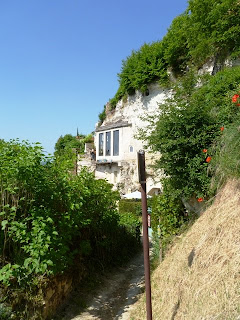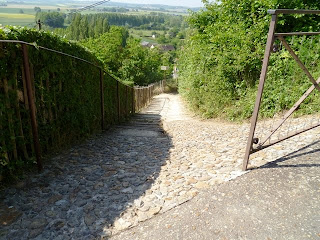When you are able to be in the moment, it is amazing what can open to you. Slowing down, looking around have led us to chance encounters with interesting people. Here are a few recent encounters.
For hundreds of years, French people have been living in caves cut out of the cliff faces of soft tufa limestone or dug underground. Disused since the 50s when social housing became a state priority, caves have made a comeback. Today many of these rough dwellings have been snapped up as idiosyncratic homes. The caves also provide ideal conditions for wine storage and most recently for growing mushrooms. The Loire and Loir valleys are dotted with former cave villages. Of course, the granddaughters were fascinated by the idea of living in a cave so we set out to see Trôo, the troglodyte village on the Loir River.

 Frustrated in our attempt to visit the museum, I noticed a woman emerging from the cave home above it. I called out to her in French, wondering if she knew who the museum staff person might be. Imagine our surprise when a deep, very English voice replied! She told us the museum was definitely closed and, in answer to our question, that she had had her cave since 1991. I longed to ask more but she set off purposefully down the steep path, carrying a dirty casserole dish and a wine carafe. We spent some time speculating about what could have led her to a cave in a small village.
Frustrated in our attempt to visit the museum, I noticed a woman emerging from the cave home above it. I called out to her in French, wondering if she knew who the museum staff person might be. Imagine our surprise when a deep, very English voice replied! She told us the museum was definitely closed and, in answer to our question, that she had had her cave since 1991. I longed to ask more but she set off purposefully down the steep path, carrying a dirty casserole dish and a wine carafe. We spent some time speculating about what could have led her to a cave in a small village.  I was reminded of the English woman with
I was reminded of the English woman with
the bed and breakfast in Lauzerte, on our way to the Pyrenees. David thought of the woman he and Géry met on the the Ile d'Oleron near La Rochelle, alone in a small house in an isolated spot. Of course, English women have been travelling the world and writing about it for centuries and these women are part of that courageous group.

Here in La Rochelle, we were having a Sunday walk and happened upon a large blue door with a sign indicating a chapel. We were puzzling over this as there didn't seem to be a church nearby when a voice said: "Vous voulez entrer?" We looked around and an older woman was talking to us from the window of her car. We, of course, replied "Oui" so she parked her car and, accompanied by a man, arrived with a ring of very large keys. The blue door opened into a small and exquisite chapel of which they were very proud. It had been built by one of the archbishops of La Rochelle and was now used by a small group for Mass in Latin. The man turned out to be an American, who had lived in La Rochelle since the 60s. He had just donated a small organ to the chapel to accompany the Gregorian chanting of the Mass. Again, I longed to pepper him with questions about how he fetched up in La Rochelle, which in the 60s was really a backwater. His manner didn't invite questions of that sort.
Perhaps it isn't only the notion of slowing down and being in the moment but also having the interest and the courage to approach people and ask questions. I have done this far more frequently here than I ever do at home. Now I am wondering why? What is it about being away that makes me more courageous or even more interested? And would people at home respond so readily to me as they do here, knowing I am a foreigner. More to think about as we begin to plan for our return to Toronto. How will we carry what we have learned this year into our life in Toronto?
For hundreds of years, French people have been living in caves cut out of the cliff faces of soft tufa limestone or dug underground. Disused since the 50s when social housing became a state priority, caves have made a comeback. Today many of these rough dwellings have been snapped up as idiosyncratic homes. The caves also provide ideal conditions for wine storage and most recently for growing mushrooms. The Loire and Loir valleys are dotted with former cave villages. Of course, the granddaughters were fascinated by the idea of living in a cave so we set out to see Trôo, the troglodyte village on the Loir River.

 Frustrated in our attempt to visit the museum, I noticed a woman emerging from the cave home above it. I called out to her in French, wondering if she knew who the museum staff person might be. Imagine our surprise when a deep, very English voice replied! She told us the museum was definitely closed and, in answer to our question, that she had had her cave since 1991. I longed to ask more but she set off purposefully down the steep path, carrying a dirty casserole dish and a wine carafe. We spent some time speculating about what could have led her to a cave in a small village.
Frustrated in our attempt to visit the museum, I noticed a woman emerging from the cave home above it. I called out to her in French, wondering if she knew who the museum staff person might be. Imagine our surprise when a deep, very English voice replied! She told us the museum was definitely closed and, in answer to our question, that she had had her cave since 1991. I longed to ask more but she set off purposefully down the steep path, carrying a dirty casserole dish and a wine carafe. We spent some time speculating about what could have led her to a cave in a small village.  I was reminded of the English woman with
I was reminded of the English woman with the bed and breakfast in Lauzerte, on our way to the Pyrenees. David thought of the woman he and Géry met on the the Ile d'Oleron near La Rochelle, alone in a small house in an isolated spot. Of course, English women have been travelling the world and writing about it for centuries and these women are part of that courageous group.
Then, while visiting the small village of Lavardin, classed as one of the most beautiful in France, our search for a cave led to another chance encounter. Wandering down the road to take
photos of the imposing ruined castle at the top of the hill, I saw a sign indicating a sculpture atelier. Barging in, I discovered a woman with long blond hair. We had come across Aprille Best Glover, a wonderful American sculptress. Aprille was warm and welcoming, spending time with us and our granddaughters, talking a bit about her work, her cave and her life in this small village. She was warm, gracious and funny. For more information about her and her writer husband, see their web sites.
http://aprille.net/
http://cavelife.net/
http://aprille.net/
http://cavelife.net/

Here in La Rochelle, we were having a Sunday walk and happened upon a large blue door with a sign indicating a chapel. We were puzzling over this as there didn't seem to be a church nearby when a voice said: "Vous voulez entrer?" We looked around and an older woman was talking to us from the window of her car. We, of course, replied "Oui" so she parked her car and, accompanied by a man, arrived with a ring of very large keys. The blue door opened into a small and exquisite chapel of which they were very proud. It had been built by one of the archbishops of La Rochelle and was now used by a small group for Mass in Latin. The man turned out to be an American, who had lived in La Rochelle since the 60s. He had just donated a small organ to the chapel to accompany the Gregorian chanting of the Mass. Again, I longed to pepper him with questions about how he fetched up in La Rochelle, which in the 60s was really a backwater. His manner didn't invite questions of that sort.
Perhaps it isn't only the notion of slowing down and being in the moment but also having the interest and the courage to approach people and ask questions. I have done this far more frequently here than I ever do at home. Now I am wondering why? What is it about being away that makes me more courageous or even more interested? And would people at home respond so readily to me as they do here, knowing I am a foreigner. More to think about as we begin to plan for our return to Toronto. How will we carry what we have learned this year into our life in Toronto?


